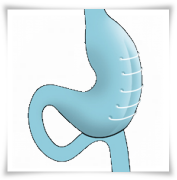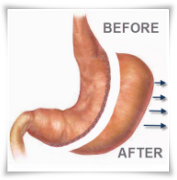Surgery For Weight Loss
Surgery for weight loss is typically thought of as the last option to lose that excess weight, but for some individuals, it can be the only choice…and a life saving decision. Lots of people that are overweight or obese have tried, and failed, many times to lose weight though diet and exercise. Diet and exercise can work for some, but it is not a viable solution for everyone.
Many people who qualify for bariatric surgery are usually suffering from some type of severe health problems related to their weight, such as diabetes, heart problems and sleep apnea.
Surgery for weight loss is not just about looking better, it also about living healthier. There are many forms of surgery that can either restrict your food intake, change how you digest food, or both, to help you lose excess weight.
Surgery For Weight Loss – Qualifying
Surgeons use the individual’s body mass index (BMI) as the basis to be able to determine whether you qualify as a candidate for surgery for weight loss. The BMI is calculated based on the person’s height and weight.
If you have a 40 and above BMI, then you fall in the severely obese category and therefore you can qualify for surgery for weight loss. A man who has a BMI of 40 is more or less is about 100 lbs overweight, while a woman with a 40 BMI is about 80 lbs overweight.
An individual may also qualify to be a candidate if:
- The BMI is between 35 to 40 lbs.
- There is a medical condition that has negative effects such as diabetes, heart failure, sleep apnea and osteoarthritis.
- In spite of diet & exercise, the weight is still uncontrolled.
Being overweight increases the chances of acquiring medical some problems like heart disease, diabetes and elevated blood pressure, but surgery for weight loss can help you to avoid those health issues.
Surgery For Weight Loss – Insurance Coverage
Many insurance companies do offer coverage when it comes to surgery for weight loss. However, you must qualify for coverage. With most insurers, you will need to provide documented proof that you have tried other methods for a specific amount of time to lose the weight. The data should include a structured diet program and nutritional therapy, exercise regimen, lifestyle change and support group. Indicate that all of those methods have been attempted but have failed. Then you may be able to get insurance to pay for your surgery for weight loss.
Surgery For Weight Loss – The Options
 Here are the most common types of surgery for weight loss:
Here are the most common types of surgery for weight loss:
- Gastric Sleeve
- Gastric Band (Lap-Band)
- Gastric Bypass
- Gastric Balloon
- Liposuction
Click here to read more about the Gastric Sleeve.
Surgery For Weight Loss – How It Is Performed
Open Surgery
In this type of surgery for weight loss, the surgeon will make a large surgical cut to open up your stomach, then proceed with the bypass by working on the stomach, small intestines and other organs.
Laparoscopic Surgery
The surgeon will make 4 to 6 tiny cuts in the stomach and will then insert a laparoscope through one of these cuts. The laparoscope is will be connected to a video monitor so that the surgeon can clearly see the insides of the stomach. Small instruments will be inserted through the openings to perform the procedure.
In the case of the gastric balloon, no surgery may be required, only an anesthetic. The patient is put under, and while unconscious, the gastric balloon is deflated and inserted into the stomach through the mouth. It is then inflated, and then the patient will wake up. No incisions are required.
Surgery For Weight Loss – Complications
The complications of surgery for weight loss again will vary with the type of procedure performed. Generally, the short-term complications can include: infection on the surgical site, leakage, bleeding, tearing around the stomach, ulcer, tachycardia and blood clots. Also, if general anesthesia is used, it comes with its own risks, so speak with your bariatric surgeon and get all the facts before you commit to surgery for weight loss.
Long-term complications are: dehydration, anemia, hernia, gallstone and nutritional deficiency. Regaining of the lost weight and not able to drop down the excess weight are also some of the most possible complications of surgery for weight loss. It has been noted that 1 in 10 patients who have undergone surgery for weight loss regained their weight or were not able to lose the desired weight.
Surgery For Weight Loss – What To Expect Afterwards
Oftentimes what to expect after the surgery will solely depend on the type of surgery for weight loss that has been performed. But generally speaking, after the surgery the patient is advised to follow a strict controlled diet. A few weeks following the procedure, the patient will be progressively shifted from liquid diets, pureed foods to semi solid foods and eventually to solid foods. The patient will be advised to chew their food slowly and to eat in small portions. This type of new eating routine may take some time to be able to adjust to.
A dietician will closely monitor the patient prior to and following the surgery to ensure a healthy weight loss, and that there are no ill side effects or complications.
The main concern here is to have enough nutrients and the same time stay hydrated. It is also advised to gradually shift from the liquid diet to solid foods as the stomach gradually heals so that no unnecessary stress is put on it. It is also essential to incorporate protein in the daily diet and take the prescribed nutritional supplements and vitamins.
Since people differ from each other, each has also has different food tolerance subsequent to the bariatric procedure. There are some people for example that are not able to tolerate bread or meat while others cannot eat sweet foods and drink sodas.
Surgery For Weight Loss – The Results
The weight loss result is often impressive for the first few months after the procedure and it progressively lessens over time. The amount of weight lost, and the rate you lose it will vary with each type of procedure, but the end result will usually be a lower weight, and less weight-related illnesses.
Surgery for weight loss means that you must be committed to ensuring a successful weight loss, and you must stick to your doctor’s advice, your diet, and make sure you get some exercise. A lifestyle change is usually the best way to go about this, developing good habits will lead you to a safe and healthy weight loss, and will also help you to keep that weight off. If you are struggling with your weight, or are losing the battle with obesity, then a bariatric procedure may be the way to go. Speak to your doctor and find out more about the different types of surgery for weight loss.

